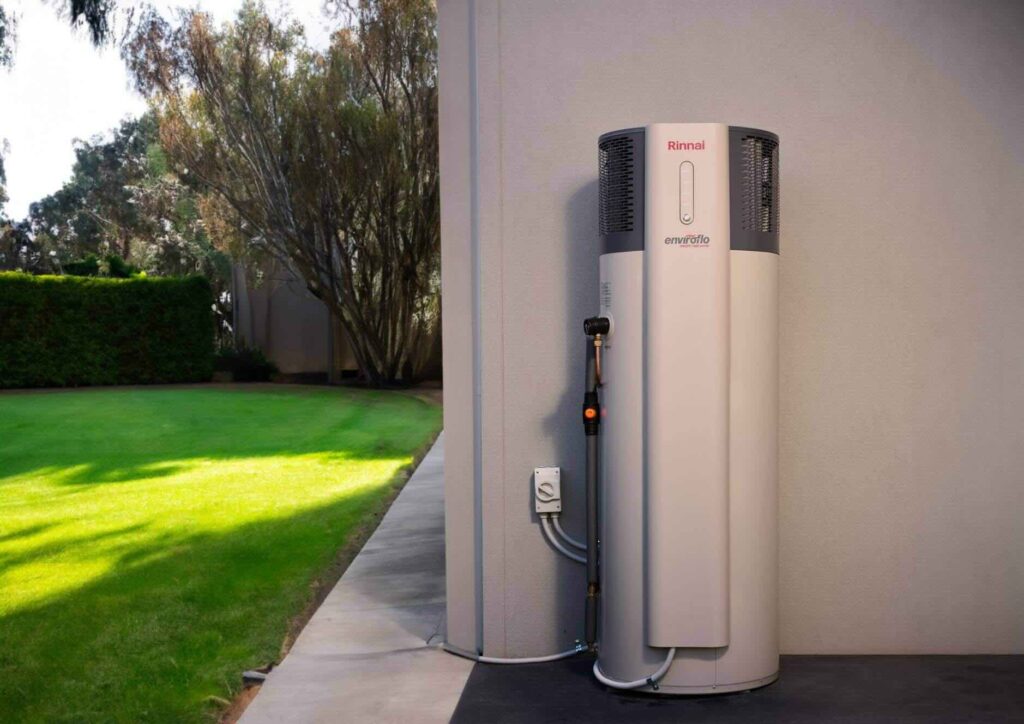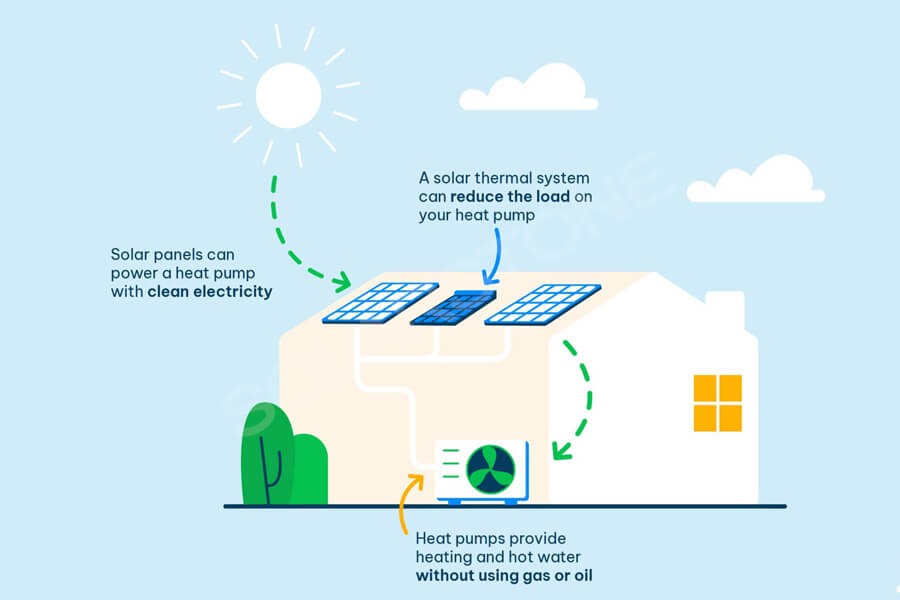Heat pump hot water systems offer an efficient and eco-friendly way to heat water for your home. Heat pump hot water systems use less energy from the grid per litre of water heated when compared with traditional gas or electric hot water systems. This article will explore how heat pump hot water systems work, their benefits, installation considerations, pricing and maintenance tips.

What Is a Heat Pump Hot Water System?
A heat pump hot water system uses advanced heat pump technology to heat water efficiently. Unlike traditional systems that generate heat through burning gas, oil, or electric resistance, heat pumps move heat from one place to another. They extract heat from the air, ground, or water and transfer it into your water storage tank. This process makes the system highly efficient, providing hot water while using less energy.
You’re most likely familiar with heat pumps in appliances like air conditioners and refrigerators. For example, your fridge extracts heat from the freezer and releases warm air from the back.
How Does It Work?
Understanding how a heat pump hot water system works doesn’t require technical knowledge. Here’s a simple breakdown:
- Heat Absorption: The system absorbs heat from the surrounding air, even when it’s cold outside. This is important because it means the system can work efficiently year-round.
- Heat Transfer: The absorbed heat is then transferred to the water in a storage tank. The process is similar to how a refrigerator cools food by removing heat.
- Hot Water Supply: Once the water in the tank reaches the desired temperature, it’s ready for use in your home. You can enjoy hot showers, clean dishes, and more without worrying about running out of hot water.

Benefits of Heat Pump Hot Water Systems
Heat pumps offer several benefits that make them an attractive option for homeowners. Here are some key advantages:
- Energy Efficiency: These systems are highly efficient. They can provide three to four times more hot water than the energy they consume. As a result, you’ll notice a significant reduction in your energy bills.
- Cost Savings: Although the initial investment for a heat pump hot water system may be higher than traditional heaters, the long-term savings make it worth it. Many homeowners see a decrease in their monthly utility costs after installation.
- Environmentally Friendly: Using renewable energy sources with a heat pump reduces your carbon footprint. This eco-friendly choice helps you contribute to a healthier planet.
- Year-Round Performance: Heat pump systems are versatile and can work effectively in various climates. They can provide hot water even in cooler temperatures, ensuring you have a reliable supply throughout the year.
- Durability: With proper care, heat pump hot water systems can be long-lasting with many systems able to operate efficiently for over 15 years, making them a solid investment.
How a Heat Pump Works with a Solar System
When you combine a heat pump hot water system with a solar system, the system can run on solar energy. Here’s how it works:
- Solar panels capture sunlight and convert it into electricity, which powers the heat pump system.
- The heat pump extracts heat from the surrounding air to heat the water in the storage tank.
- If the air doesn’t provide enough heat, the heat pump draws extra energy from its backup heating element, which can also be supported by the solar panels.
- Once the water reaches the desired temperature, it gets stored in the tank until needed.
By integrating a heat pump system with a solar system, homeowners benefit from two highly efficient technologies for heating water. The solar panels significantly reduce the energy required to operate the heat pump, leading to substantial energy savings.

Pricing of Heat Pump Hot Water Systems
When considering a heat pump hot water system, understanding the costs involved is important. Prices can vary based on several factors:
- System Type: Different brands and models come with varying price tags. Generally, larger systems that can provide more hot water will cost more.
- Installation Costs: Installation can vary in price based on your location and the complexity of the setup. Getting multiple quotes from local installers helps you find the best deal.
- Additional Equipment: If you need extra equipment, such as solar panels or upgraded electrical systems, these costs can add up. Be sure to factor in any additional expenses when budgeting for your new system.
- Available Incentives: Remember that any rebates or incentives can help reduce your overall investment.
- Victoria – Hot water rebates of up to $1,000 are available for eligible heat pumps and solar hot water systems. For more details and to check eligibility, please refer to Solar Victoria.
- NSW – Unlike a rebate, a discount on the installation cost of a hot water system is provided in NSW as an incentive. This incentive is paid directly by an accredited supplier who will pass on the discount to you. If you’re eligible, incentives could range between $190 and $670. For further details and eligibility see
NSW Climate and Energy Action. - ACT – The Home Energy Support Program provides up to $2,500 in rebates for eligible homeowners to help with the costs of installing a hot water heat pump. For more information and to check eligibility, visit ACT Government.
On average, homeowners can expect to pay between $3,000 and $7,000 for a heat pump hot water system, including installation. While this may seem high, many people find that the savings in energy costs make it a worthwhile investment.
Choosing the Right Heat Pump Hot Water System
Selecting the right heat pump hot water system for your home can feel overwhelming, but it doesn’t have to be. Here are some helpful tips:
- Assess Your Hot Water Needs: Consider how much hot water your household typically uses. This will help you determine the right size system for your needs.
- Research Different Models: Explore various brands and models to find the best fit. Look for systems with good warranties and reliable customer reviews.
- Consult a Professional: Speaking with an installer can provide valuable insights. They can help you assess your home’s specific needs and recommend suitable options.
- Read Customer Reviews: Look for feedback from other homeowners to gauge the performance of specific models. This information can help you make an informed decision.
Maintenance Tips
To ensure the longevity and efficiency of your heat pump hot water system, follow these maintenance tips:
- Regular Inspections: Schedule annual inspections with a qualified technician. They can check for any potential issues and ensure the system operates efficiently.
- Clean the Solar Panels: Keep the solar panels clean and free of debris. Regular cleaning ensures they can capture sunlight effectively.
- Monitor Temperature Settings: Set the temperature of the water storage tank to an efficient level.
- Check for Leaks: Regularly inspect for signs of leaks around the storage tank and heat pump unit. Addressing leaks promptly can prevent further damage and maintain efficiency.
- Inspect the Heat Pump: Keep an eye on the heat pump unit. Ensure that it remains clear of obstructions to maintain proper airflow and efficiency.
Conclusion
In summary, heat pump hot water systems offer a sustainable and cost-effective solution for heating water in your home, particularly when combined with a solar system. With their energy efficiency, longevity, and versatility, heat pumps provide numerous benefits compared to traditional water heaters. By harnessing renewable energy, you can enjoy the comfort of hot water while minimising your energy costs.
If you’re considering upgrading your water heating system, explore heat pump hot water systems to start reaping the benefits today!